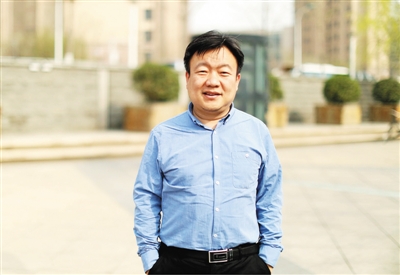
Intelligent electronic products that can continue being used for months or even years without recharging; a new layer of material on the wall that will replace air conditioners and heaters…..These may not be farfetched fantasies. Professor Feng Wei from the School of Materials Science and Engineering at Tianjin University and his “dream team”, are making efforts make these ideas become reality.
Under the leadership of Feng his research group of “carbon-explorers” have successfully made carbon materials sensitive to light.
Recently, the team developed a new type of Fluorine and Nitrogen Co-doped Carbon Dots (FNCDs) with self-protective room-temperature phosphorescence. The academic paper related to this research was published recently online in Advanced Functional Materials.
Leading the “dream team” to turn carbon into gold
After finishing his undergraduate, master and doctoral studies at Xi’an Jiaotong University in 1999, Feng went to Japan for further study. When returning to China in 2002, Feng worked as a Postdoctoral Researcher at the Polymer Research Institute at Tsinghua University.
Feng did not come to Tianjin University until 2004 and founded the laboratory and built the “dream team”.
At Tianjin University, everyone who is acquainted with Feng calls his work “turning carbon into gold”. In the lab, after being engraved by Feng, the thermal conductivity and structural strength of the tiny carbon nanofibre tubes changes. At the same time, when combined with common materials such as thermal and electrical conductors, the carbon tubes improve their properties
Although this team has only been working for 15 years, it has published more than 150 SCI papers in international mainstream journals and won major awards such as the first prize for Technological Inventions in Tianjin many times.
“Playing” scientific research also needs one-track mind
Feng always says scientific research should be like “play”. Only if one does scientific research with a “playful” mentality and a keen sense of curiosity and interest can one have the eyes to find problems quickly.
In 2005, when 35-year-old Feng was on a business trip in Shandong, he happened to pass by a large area of cropland. The sun was sinking in the west, endless sunflowers all looked towards the sun, swaying in the wind. At that time, Feng Wei had a whimsy: a sunflower could “turn its head” in the direction of light because it could sense the change of light exposure. Then he thought, could carbon tubes have the same property as plants that can respond to light?
Feng decided to prove this bold hypothesis experimentally. After returning to school, he took matters into his own hands and attached photosensitive materials to the carbon tubes, trying to “excite” the properties of the carbon materials with light. After more than a year of hard work and countless failures, Feng’s team finally succeeded in making black-body nanocarbon materials that were sensitive to light.
In 2006, Feng published a paper about the structure of azobenzene-carbon nanotubes in the international Journals of Applied Physics and Carbon which was also the world’s first academic paper on the study of the photosensitive structure of carbon tubes.
As to finding the direction of scientific research, Feng who “plays” at scientific research is a little bit “one-track minded”. “I usually say to my young teachers and students in the team that we should stick to our own way.” said Feng, “The most indispensable thing in scientific research is perseverance. Only by proceeding systematically in one direction can we have deeper discoveries.”
Making an effort to cultivate students’ good behavior and habits
“Professor Feng never urges us to publish papers and sometimes even makes us publish less.” said many students in the “dream team”.
Feng believes doing research should not mean blindly pursue publishing theses, because numbers of articles are meaningless.
In Feng’s opinion, not only should scientific research achievements be the focus, but “soft power” such as attitude towards scientific research and behavior also need attention. “Students nowadays are well-qualified and talented, but sometimes they don’t do things so carefully and lack a sense of collective responsibility.” Feng asks his students to clean up the laboratory every day, as well as replenishing consumable preparations in time and putting equipment in place after using it.
When finding negligent students, Feng uses a “traditional” punishment: writing self-criticisms. Feng keeps these self-criticisms in his filing cabinet and presents them solemnly as gifts to students upon graduation. “Good manners and a rigorous attitude towards scientific research can bring lifelong benefits. I hope each of them can truly understand this truth and keep practicing it for a lifetime.” said Feng.
In early autumn, Feng said to the group of newly-joined young people: “Each of you is smart, but you need to be taught by teachers and educated by the university so that you can be the ‘gold’ in the crowd and make contributions to the society.”






